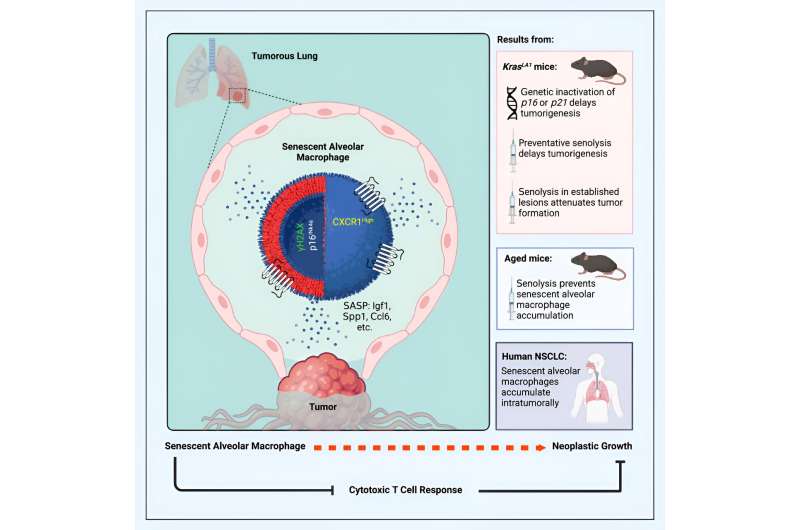This article has been reviewed according to Science X's editorial process and policies. Editors have highlighted the following attributes while ensuring the content's credibility:
fact-checked
peer-reviewed publication
trusted source
proofread
Study finds senescent immune cells promote lung tumor growth

Macrophages are a type of white blood cell that are among the body's first line of defense against infection. In addition to killing harmful microorganisms, macrophages typically can initiate a response against tumors. However, macrophages, like other cells, can enter a state called senescence, which is linked to aging, disease and multiple physiological problems.
When cells become senescent, they stop dividing, but they do not die and are not always eliminated from the body. They can linger and accumulate in tissues and may secrete molecules that are harmful. This is why senescent cells have been called "zombie cells." The reason why healthy cells become senescent is not well understood.
In new Cancer Cell study, researchers discovered senescent macrophages in the lung that not only lingered but also promoted tumor growth.
"Conceptually, the idea that a macrophage can become senescent and be tumor-promoting is unexpected," says Darren Baker, Ph.D., a Mayo Clinic senescent cell biologist and senior author of the study. "This finding brings us one step closer to better understanding how tumors and cancer form at the cellular level."
Dr. Baker and his colleagues found that senescent macrophages appear to block the immune system from being able to respond to and eliminate the abnormal growth of cells. This leads to a tumor.
"Through different experiments and analyses, we could distinguish those senescent macrophages from the other macrophages. We found that if we eliminate them, through genetic or pharmacological approaches, we delay tumor formation," says lead author Luis Prieto, Ph.D., a postdoctoral fellow and recent graduate of the Mayo Clinic Graduate School of Biomedical Sciences.
The researchers reasoned that precancerous cells communicated with the surrounding cells, including macrophages, and triggered the macrophages to become senescent. In turn, the senescent cells then appeared to alter the surrounding area in a way that promoted tumor growth.
Single-cell sequencing points in a new direction
Initially, the researchers thought removing the senescent cells would result in more adenomas, the type of lung tumor studied. But the results of their early experiments showed otherwise.
"It was very challenging, because every time we would do an experiment, it was just the opposite of what we'd expect," Dr. Prieto says. "If one removes tumor suppressors regulating senescent cells, one would expect to have more tumors, but it actually just happened to have the opposite results. There were fewer tumors in the absence of those tumor suppressors."
The researchers worked with study co-author Hu Li, Ph.D., an individualized medicine researcher at Mayo Clinic, and conducted single-cell RNA sequencing in his lab. This work helped them identify lung macrophages as a key cell type driving tumor growth. Now, they believe the macrophages are responding to the precancerous cells as they begin to cause tumors.
"We had to rethink our initial ideas as we learned a lot more about what cells can do. Then, it started to make a lot more sense about how senescent macrophage cells can influence other cells, the environment and the immune system in this case," Dr. Baker says.
A complementary paper by researchers based in the U.K. was also published in the journal Cancer Cell.
More information: Luis I. Prieto et al, Senescent alveolar macrophages promote early-stage lung tumorigenesis, Cancer Cell (2023). DOI: 10.1016/j.ccell.2023.05.006
Scott Haston et al, Clearance of senescent macrophages ameliorates tumorigenesis in KRAS-driven lung cancer, Cancer Cell (2023). DOI: 10.1016/j.ccell.2023.05.004




















